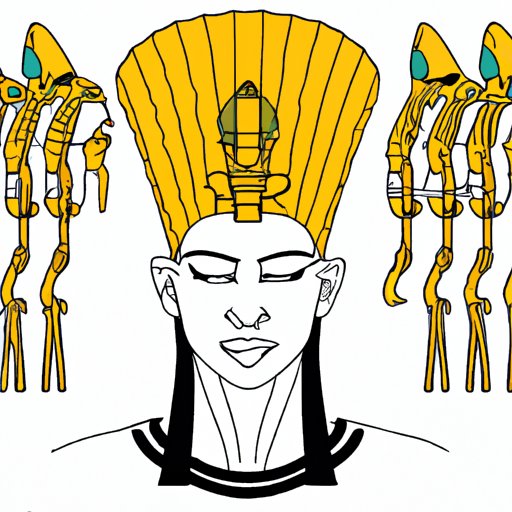Introduction
Akhenaten is one of the most famous pharaohs of Ancient Egypt, known for his religious reforms and his promotion of monotheism. He is often referred to as “the heretic king” because of his rejection of traditional Egyptian beliefs in favor of a single deity, the sun god Aten. But was he a good leader? This article will explore this question by examining the historical sources available and analyzing the impact of Akhenaten’s reign on Ancient Egypt.
Analyzing Akhenaten’s Leadership Through Historical Sources
The first step in evaluating Akhenaten’s reign is to analyze the primary and secondary sources available. Primary sources provide firsthand accounts of events and are typically considered to be more reliable than secondary sources. These include letters, official documents, artwork, and archaeological evidence. Secondary sources are written accounts of events based on primary sources and can be biased or unreliable. Examples include books, articles, and biographies.
Examining Primary Sources
Primary sources provide valuable insight into Akhenaten’s reign. For instance, the Amarna Letters, a collection of diplomatic correspondence from rulers in the Near East, shed light on the political relationships between Egypt and its neighbors. Artwork from Amarna, Akhenaten’s capital city, reveals his devotion to Atenism and his belief in a single god. Archaeological evidence, such as the tombs of high-ranking officials, also provides information about Akhenaten’s rule.
Assessing the Accuracy of Secondary Sources
Secondary sources must be carefully evaluated to ensure accuracy. Many of these sources were written by scholars who had an agenda or bias, so it is important to consider the author’s perspective when assessing the reliability of the material. Additionally, some sources may contain outdated or inaccurate information, so it is important to cross-reference with other sources to verify accuracy.
Examining the Impact of Akhenaten’s Reign on Ancient Egypt
Akhenaten’s rule had far-reaching impacts on Ancient Egypt. His reforms changed the social, political, and economic landscape of the country. The introduction of Atenism led to a shift in religious beliefs, while his closing of temples caused widespread economic disruption. He also implemented sweeping social reforms, such as the elevation of Nefertiti and the support of women’s education.
Evaluating Akhenaten’s Political and Religious Reforms
Akhenaten’s most significant reform was the introduction of Atenism, a religion devoted to the worship of the sun god Aten. He closed all the temples dedicated to traditional polytheistic gods, replacing them with temples devoted to Aten. This move was controversial and deeply unpopular with the majority of Egyptians, who had been worshipping multiple gods for centuries.
Discussing Akhenaten’s Legacy and Influence in Modern Times
Despite the controversy surrounding his rule, Akhenaten left a lasting legacy in Ancient Egypt and beyond. His influence can still be seen today in art and architecture, as well as in religious beliefs. His promotion of monotheism laid the foundation for later religions such as Christianity and Islam. He also helped to preserve the concept of a single, powerful god for generations to come.
Examining the Role of Women During Akhenaten’s Rule
Akhenaten’s rule had a profound impact on the role of women in Ancient Egypt. He elevated his wife, Nefertiti, to a prominent position in society and supported her pursuit of knowledge and education. He also allowed women to hold positions of power and influence, something that had previously been unheard of in Ancient Egypt.

Exploring How Akhenaten Changed the Face of Ancient Egyptian Society
Akhenaten’s rule marked a major shift in Ancient Egyptian society. He rejected traditional polytheistic beliefs in favor of monotheism, which was a radical departure from previous religious practices. He also abolished many of the old social norms, elevating women and giving them more rights and freedoms. In doing so, he helped to create a more egalitarian society.
Conclusion
In conclusion, Akhenaten was a revolutionary leader who made a lasting impact on Ancient Egypt. His religious reforms, social reforms, and promotion of monotheism helped to shape the course of history and continue to influence modern society. While his reign was not without controversy, it is clear that Akhenaten was a leader who left an indelible mark on the world.
(Note: Is this article not meeting your expectations? Do you have knowledge or insights to share? Unlock new opportunities and expand your reach by joining our authors team. Click Registration to join us and share your expertise with our readers.)
